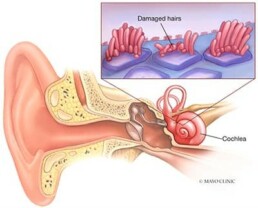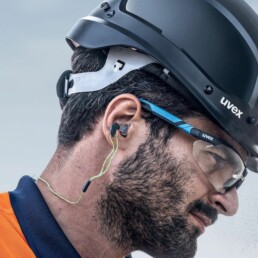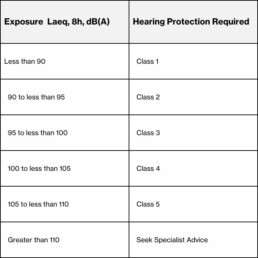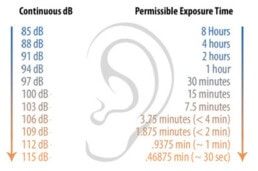In Australia, around 14-20% of people are estimated to experience tinnitus at some point in their life, and 25% of the Australian workforce experience tinnitus.
What causes tinnitus?
Tinnitus in itself is experienced as noises or ringing in your ears or head when no physical noise is present and is assigned as a symptom (not a disease) of a problem in your auditory system that can be caused by various factors, including:
- Natural degeneration
- Exposure to loud sounds
- An injury to the ear
- Ear infections
- Some medications
All these factors damage the tiny hair cells in the cochlear. These cells cannot be regenerated so factors above can lead to irreparable hearing loss.

Effects of tinnitus
Tinnitus is broken into 3 segments being occasional, intermittent and constant. Regardless of the stage the symptoms can be extremely debilitating and really affect our quality of life both at work and in everyday life activities. Some of the potential effects of tinnitus can include:
- Depression and anxiety
- Frustration and anger
- Inability to concentrate
- Sleeping issues
Preventing tinnitus
Limit exposure to loud sounds – Weather that be at work in industrial settings to mowing your lawn on the weekend, overexposure to loud noises without adequate protection can be hazardous.
Use hearing protection – When in noisy environments appropriate hearing protection like earplugs and earmuffs can significantly reduce the intensity of the noise reaching your ears. Appropriate breaks should be taken to ensure our ears have plenty of time to rest.
Lowering the volume – When listening to music or radio through the plethora of connected devices we have keep the volume at a moderate. Companies like apple are introducing more control over your listening experience and you can now set a volume limit of devices like your Airpods. More info here; https://www.youtube.com/watch?v=cJtXaWnU894

Treatment and management of tinnitus
Talk to your GP or an ENT (ear, nose and throat) specialist for further advice or to rule out any underlying medical issues. If your tinnitus is caused by a condition such as an ear infection, treating the infection may relieve the symptoms. If your tinnitus is not linked to a medical condition, there are still options available to help you manage it effectively.
Come to terms with the condition – Sometimes the best thing is to acknowledge and accept that tinnitus is and will be a part of your life and focus on ways to normalise it.
Diet and exercise – Regular exercise and a healthy diet can contribute to cardiovascular health which can indirectly benefit our hearing.
Mange stress and anxiety – Relaxation techniques like meditation can aid in the reduction of depression and anxiety improving our mental health and can improve our overall quality of sleep.
Being mindful of medication – Some medications can worsen the effects of tinnitus, so it is important that you consult expert advice to see what changes may be available to you.
Noise exposure at work
Frequent, prolonged exposure to loud noise increases the risk of getting tinnitus.
The length of time you can safely be exposed to sound over 85 dB without needing hearing protection depends on the intensity of the sound. The energy the sound waves carries doubles with every increase of 3 dB, so even though an excavator doesn’t sound twice as loud as city traffic, it is twice as intense.
With each increase of 3 dB, the length of safe exposure time halves. For sounds above 100 dB (a nightclub for example) you’re at risk of hearing damage after just 15 minutes!

The noise exposure standard
If you work somewhere where noise levels exceed 85 decibels (over an eight 8 period) it is the duty of the PCBU (Person Conducting a Business or Undertaking) to provide hearing protection suitable to the application and to ensure employees are trained and educated in the risks associated with noisy environments.
Machines like lawnmowers, drills and leaf blowers emit noise around 85dB. This rule changes depending on time exposure to the noise or the shift duration. For example, the overexposure risk at 91dB over a 2 hour period is the same as 85 decibels over eight hours.

However, in social environments there are no rules, and no protection is provided so it is up to the individual to protect themselves.
It is important to remember that hearing damage cannot be reversed. Protect your hearing by reducing the time you’re exposed to loud noise or by using earplugs or earmuffs.
uvex has a comprehensive range of products suitable for a variety of different applications.
Find out more here: https://www.uvex-safety.com.au/en/products/hearing-protection/
Sources:
https://www.betterhealth.vic.gov.au/health/conditionsandtreatments/tinnitus#effects-of-tinnitus
https://www.safeworkaustralia.gov.au/safety-topic/hazards/noise
Image sources: